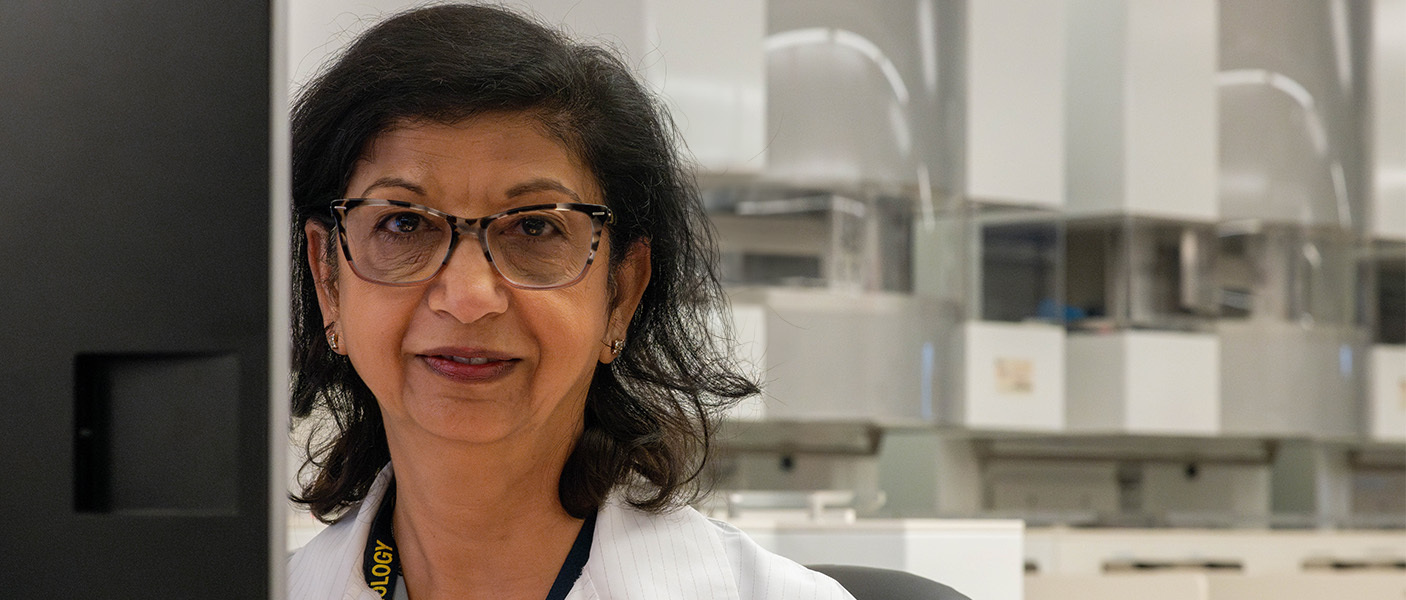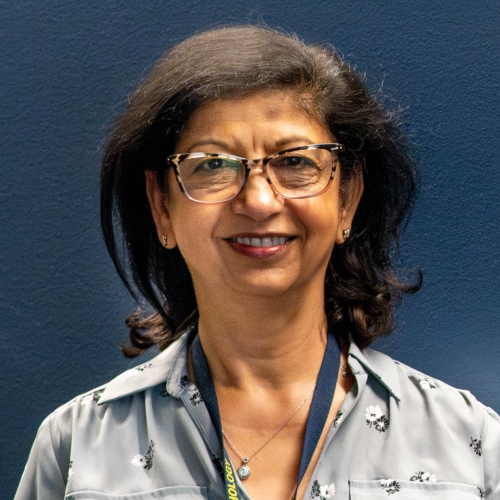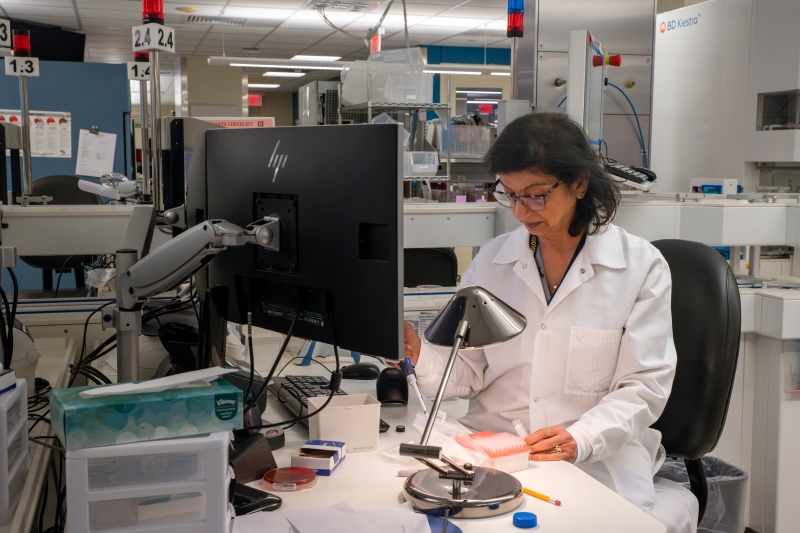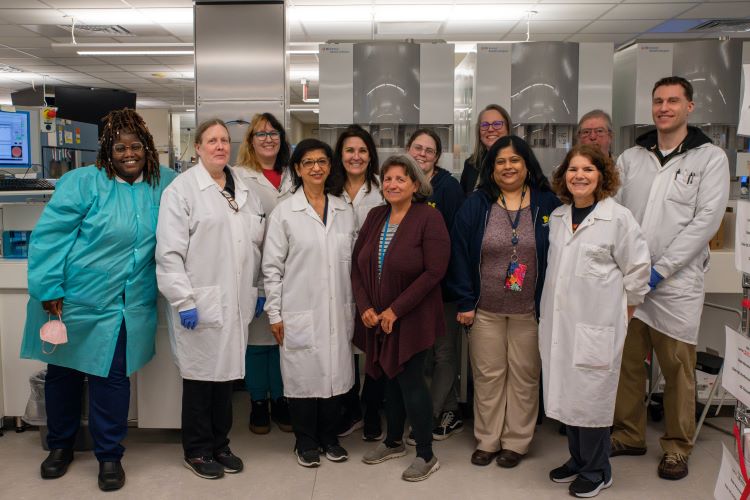

 Sunita Punjabi arrived in the United States from India during the summer of 1970 at the age of 8 years old, along with her parents and three siblings. The family settled in Clawson, Michigan, and at the time, was the only ethnic family in town. Sunita spent her first couple months in the United States learning English so she could be prepared to enter the third grade in the fall. This was a challenging time for her as she was treated differently by other children. These early experiences helped to shape her into the woman she is today, with a passion and interest for DEI initiatives in the Department.
Sunita Punjabi arrived in the United States from India during the summer of 1970 at the age of 8 years old, along with her parents and three siblings. The family settled in Clawson, Michigan, and at the time, was the only ethnic family in town. Sunita spent her first couple months in the United States learning English so she could be prepared to enter the third grade in the fall. This was a challenging time for her as she was treated differently by other children. These early experiences helped to shape her into the woman she is today, with a passion and interest for DEI initiatives in the Department.
Punjabi discovered science in middle school and loved the laboratory-related classes. These were far more interesting to her than the lecture-based classes. She continued to pursue sciences in high school and took classes at Macomb Community College. It was there that she discovered Medical Technology. “I stayed at MCC for three years and earned one Associate Degree in Liberal Arts and a 2-year degree in the Medical Laboratory Technologist program,” said Punjabi. “I finished the Medical Technologist program through a scholarship at Wayne State University and was hired to work in a research laboratory at Detroit Medical Center following graduation.” She later transferred to work in the Blood Bank at DMC.
Shortly after that, she received an invitation to her cousin’s wedding in Karachi, Pakistan. “I attended my cousin’s wedding where I met a new friend. After the wedding, she introduced me to her brother-in-law, who is now my husband.” He immigrated to the United States with her.
“When my daughter was born, I stopped working, so I could focus on her. When she was about 1 year old, I applied for an open position at Michigan Medicine and was hired on November 5, 1990, processing and reading positive blood cultures in the Pathology/ Microbiology laboratory on weekends.”
While working weekends, Punjabi had opportunities to learn other areas in the laboratory. After three years, she moved to full-time work. “My role expanded to include reading Bacteriology cultures taken from all sources. Now, I also work on the Specials bench, which involves reading cultures from patients with Cystic Fibrosis." This area also sends certain samples to MDHHS (Michigan Department of Health and Human Services) for further testing.
 Over the past nearly 34 years, much has changed in the Microbiology laboratory. “When I started, almost everything was done manually. In 2018, the Microbiology Lab was moved from the main hospital to NCRC." The Kiestra Total Line Automation (Kiestra TLA) was installed at the NCRC Microbiology Lab. The agar plates are innoculated and scanned into the system and are then placed on the Kiestra automation line which brings them to the incubation areas. The different media are programmed to go to the proper incubators for CO2 or non-CO2 environment and are held for growth. The readers can see images of the growth on the agar plates on their computer screens, and can call up the plates for evaluation and testing.
Over the past nearly 34 years, much has changed in the Microbiology laboratory. “When I started, almost everything was done manually. In 2018, the Microbiology Lab was moved from the main hospital to NCRC." The Kiestra Total Line Automation (Kiestra TLA) was installed at the NCRC Microbiology Lab. The agar plates are innoculated and scanned into the system and are then placed on the Kiestra automation line which brings them to the incubation areas. The different media are programmed to go to the proper incubators for CO2 or non-CO2 environment and are held for growth. The readers can see images of the growth on the agar plates on their computer screens, and can call up the plates for evaluation and testing.
In addition to automation, science continues to advance. Bacteria become more resistant to certain antibiotics. New pathogens emerge. The COVID-19 pandemic hit the Microbiology lab particularly hard. “Thousands of respiratory samples were received every day in our lab. While the samples were tested in the Molecular area of the laboratory, we helped to prepare these samples for testing. Each sample had to be scanned and labeled. Then an aliquot was made for each sample to be tested on the instruments. We had as many people as possible to help with this process.” The intensity of the pandemic revealed the strength of the team as everyone pulled together to support one another and be sure patient care never faltered. Staff schedules changed to 3 10-hour shifts per week, rotating staff to reduce exposure. Meanwhile, routine testing had to continue to support patients with other health conditions.
 Punjabi’s favorite part of the job is that she has been able to continue to learn throughout her career. There is always something new to learn. “I learn so much here working with people, learning about microbiology, and how what you are doing helps patients. It is not just typing results all day. What we do benefits the healthcare of the patient. The patient care is the best part of the job.” She also appreciates the flexibility in the job. She has been able to learn new areas and skills. "I enjoy being a Medical Technologist. Some Medical Technoligists have gone on to become administrators, Physicians Assistants, and even gone to medical school."
Punjabi’s favorite part of the job is that she has been able to continue to learn throughout her career. There is always something new to learn. “I learn so much here working with people, learning about microbiology, and how what you are doing helps patients. It is not just typing results all day. What we do benefits the healthcare of the patient. The patient care is the best part of the job.” She also appreciates the flexibility in the job. She has been able to learn new areas and skills. "I enjoy being a Medical Technologist. Some Medical Technoligists have gone on to become administrators, Physicians Assistants, and even gone to medical school."
After nearly 34 years in the Microbiology Laboratory, Punjabi is planning to retire on March 7, 2024. She looks forward to traveling internationally and visiting out-of-state family, spending more time with her new grandson, and entertaining family and friends at home. Punjabi has two daughters of whom she is very proud. One is a mechanical engineer and lives locally and the other is a pharmacist in Minnesota.
 ON THE COVER
ON THE COVER
Breast team reviewing a patient's slide. (From left to right) Ghassan Allo, Fellow; Laura Walters, Clinical Lecturer; Celina Kleer, Professor. See Article 2014Department Chair |

newsletter
INSIDE PATHOLOGYAbout Our NewsletterInside Pathology is an newsletter published by the Chairman's Office to bring news and updates from inside the department's research and to become familiar with those leading it. It is our hope that those who read it will enjoy hearing about those new and familiar, and perhaps help in furthering our research. CONTENTS
|
 ON THE COVER
ON THE COVER
Autopsy Technician draws blood while working in the Wayne County morgue. See Article 2016Department Chair |

newsletter
INSIDE PATHOLOGYAbout Our NewsletterInside Pathology is an newsletter published by the Chairman's Office to bring news and updates from inside the department's research and to become familiar with those leading it. It is our hope that those who read it will enjoy hearing about those new and familiar, and perhaps help in furthering our research. CONTENTS
|
 ON THE COVER
ON THE COVER
Dr. Sriram Venneti, MD, PhD and Postdoctoral Fellow, Chan Chung, PhD investigate pediatric brain cancer. See Article 2017Department Chair |

newsletter
INSIDE PATHOLOGYAbout Our NewsletterInside Pathology is an newsletter published by the Chairman's Office to bring news and updates from inside the department's research and to become familiar with those leading it. It is our hope that those who read it will enjoy hearing about those new and familiar, and perhaps help in furthering our research. CONTENTS
|
 ON THE COVER
ON THE COVER
Director of the Neuropathology Fellowship, Dr. Sandra Camelo-Piragua serves on the Patient and Family Advisory Council. 2018Department Chair |

newsletter
INSIDE PATHOLOGYAbout Our NewsletterInside Pathology is an newsletter published by the Chairman's Office to bring news and updates from inside the department's research and to become familiar with those leading it. It is our hope that those who read it will enjoy hearing about those new and familiar, and perhaps help in furthering our research. CONTENTS
|
 ON THE COVER
ON THE COVER
Residents Ashley Bradt (left) and William Perry work at a multi-headed scope in our new facility. 2019Department Chair |

newsletter
INSIDE PATHOLOGYAbout Our NewsletterInside Pathology is an newsletter published by the Chairman's Office to bring news and updates from inside the department's research and to become familiar with those leading it. It is our hope that those who read it will enjoy hearing about those new and familiar, and perhaps help in furthering our research. CONTENTS
|
 ON THE COVER
ON THE COVER
Dr. Kristine Konopka (right) instructing residents while using a multi-headed microscope. 2020Department Chair |

newsletter
INSIDE PATHOLOGYAbout Our NewsletterInside Pathology is an newsletter published by the Chairman's Office to bring news and updates from inside the department's research and to become familiar with those leading it. It is our hope that those who read it will enjoy hearing about those new and familiar, and perhaps help in furthering our research. CONTENTS
|
 ON THE COVER
ON THE COVER
Patient specimens poised for COVID-19 PCR testing. 2021Department Chair |

newsletter
INSIDE PATHOLOGYAbout Our NewsletterInside Pathology is an newsletter published by the Chairman's Office to bring news and updates from inside the department's research and to become familiar with those leading it. It is our hope that those who read it will enjoy hearing about those new and familiar, and perhaps help in furthering our research. CONTENTS
|
 ON THE COVER
ON THE COVER
Dr. Pantanowitz demonstrates using machine learning in analyzing slides. 2022Department Chair |

newsletter
INSIDE PATHOLOGYAbout Our NewsletterInside Pathology is an newsletter published by the Chairman's Office to bring news and updates from inside the department's research and to become familiar with those leading it. It is our hope that those who read it will enjoy hearing about those new and familiar, and perhaps help in furthering our research. CONTENTS
|
 ON THE COVER
ON THE COVER
(Left to Right) Drs. Angela Wu, Laura Lamps, and Maria Westerhoff. 2023Department Chair |

newsletter
INSIDE PATHOLOGYAbout Our NewsletterInside Pathology is an newsletter published by the Chairman's Office to bring news and updates from inside the department's research and to become familiar with those leading it. It is our hope that those who read it will enjoy hearing about those new and familiar, and perhaps help in furthering our research. CONTENTS
|
 ON THE COVER
ON THE COVER
Illustration representing the various machines and processing used within our labs. 2024Department Chair |

newsletter
INSIDE PATHOLOGYAbout Our NewsletterInside Pathology is an newsletter published by the Chairman's Office to bring news and updates from inside the department's research and to become familiar with those leading it. It is our hope that those who read it will enjoy hearing about those new and familiar, and perhaps help in furthering our research. CONTENTS
|
 ON THE COVER
ON THE COVER
Rendering of the D. Dan and Betty Khn Health Care Pavilion. Credit: HOK 2025Department Chair |

newsletter
INSIDE PATHOLOGYAbout Our NewsletterInside Pathology is an newsletter published by the Chairman's Office to bring news and updates from inside the department's research and to become familiar with those leading it. It is our hope that those who read it will enjoy hearing about those new and familiar, and perhaps help in furthering our research. CONTENTS
|

MLabs, established in 1985, functions as a portal to provide pathologists, hospitals. and other reference laboratories access to the faculty, staff and laboratories of the University of Michigan Health System’s Department of Pathology. MLabs is a recognized leader for advanced molecular diagnostic testing, helpful consultants and exceptional customer service.